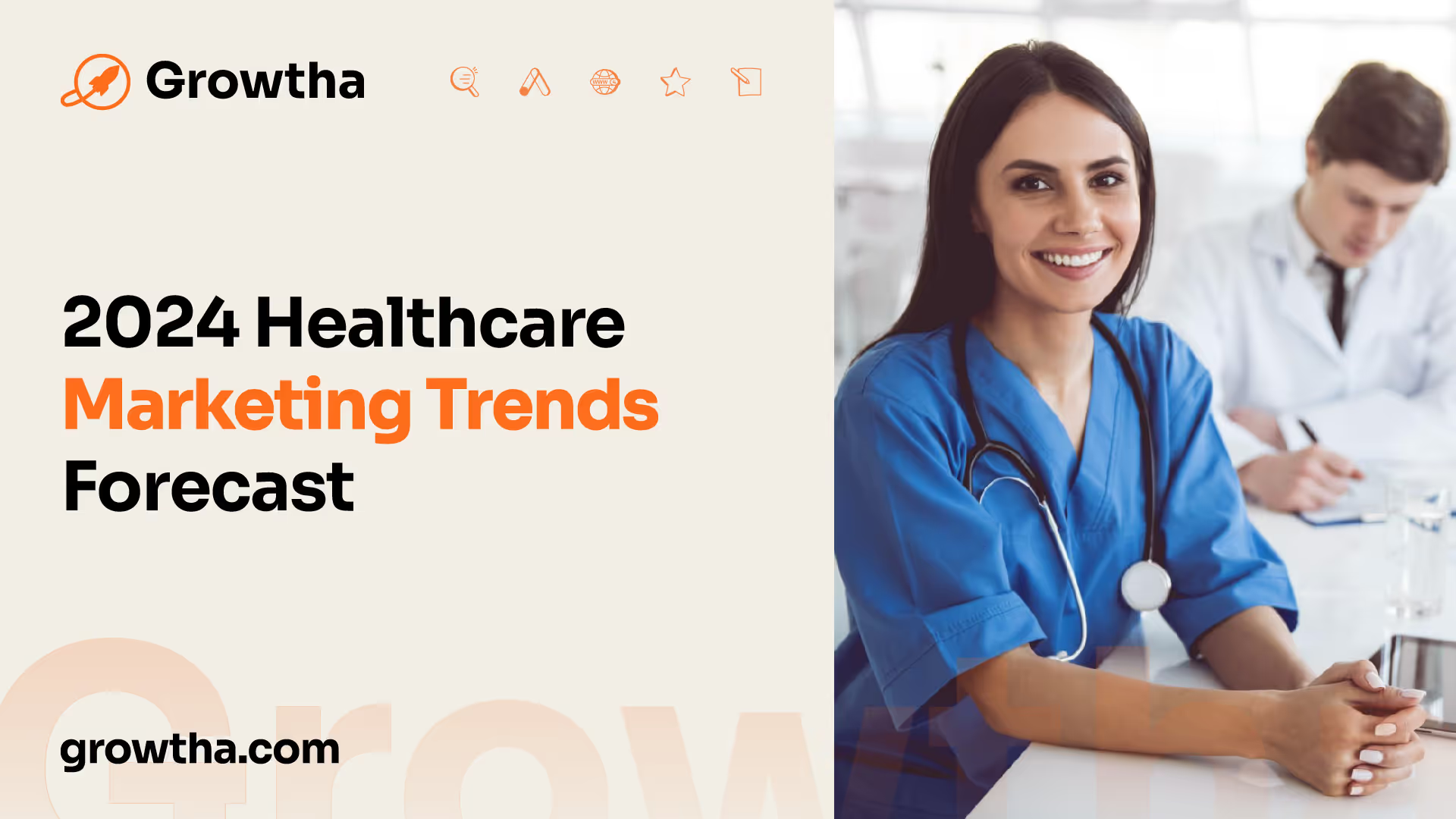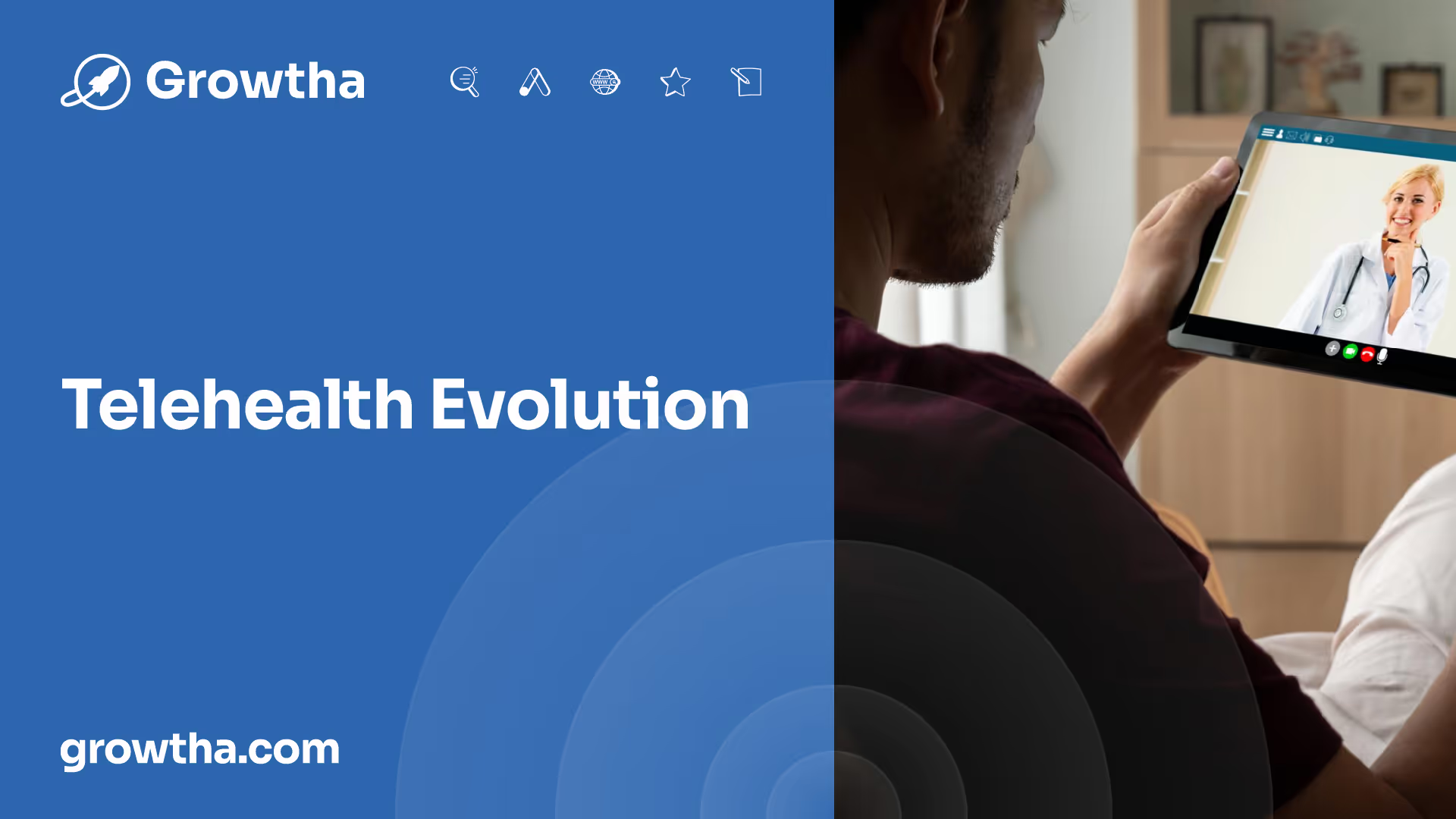2024 Healthcare Marketing Trends Forecast
In 2024, two key areas that will shape the healthcare marketing landscape are the growth of the personalized medicine market and the forecast for global healthcare expenditure.


2024 Healthcare Marketing Trends Forecast
Healthcare Marketing Trends 2024
As we look towards the future of healthcare marketing, it's important to stay informed about the latest trends and forecasts. In 2024, two key areas that will shape the healthcare marketing landscape are the growth of the personalized medicine market and the forecast for global healthcare expenditure.
Personalized Medicine Market Growth
The personalized medicine market is expected to experience significant growth in the coming years. By 2032, it is projected to be worth around USD 1,103.6 billion, showing substantial growth from USD 511.8 billion in 2022. This growth is anticipated to occur at a compound annual growth rate (CAGR) of 8.2% during the forecast period from 2023 to 2032 [1].
Personalized medicine, also known as precision medicine, involves tailoring medical treatments and healthcare decisions to individual patients based on their unique characteristics, genetics, and environmental factors. The increasing adoption of personalized medicine offers new opportunities for healthcare marketers to create targeted campaigns and reach specific patient populations.
Global Healthcare Expenditure Forecast
Global healthcare expenditure is expected to continue its upward trajectory in 2024. Forecasts indicate a year-over-year increase of 9.9%, slightly down from a 10.7% increase in 2023. The U.S. national healthcare expenditure reached $4.5 trillion in 2022 and is estimated to reach $6.2 trillion by 2028. The global healthcare market is also expected to reach $665.37 billion by 2028 [2].
These figures reflect the growing demand for healthcare services and the need for effective marketing strategies to reach and engage patients in an increasingly competitive landscape. Healthcare marketers should be prepared to adapt their strategies to cater to the evolving healthcare expenditure trends and the changing needs of the target audience.
Understanding the growth of the personalized medicine market and the forecast for global healthcare expenditure provides valuable insights for healthcare marketers. By staying informed and aligning their strategies with these trends, marketers can position themselves for success in the dynamic healthcare industry.
Digital Marketing Strategies
In the ever-evolving landscape of healthcare marketing, digital strategies have become increasingly vital. Two key areas of focus in this realm are the impact of COVID-19 on digital marketing and the role of artificial intelligence (AI) in healthcare marketing.
Impact of COVID-19 on Digital Marketing
The COVID-19 pandemic has significantly influenced digital marketing in the healthcare industry. As highlighted by NCBI, spending on digital marketing strategies has increased, leading to higher returns from direct visits and patient telemedicine to hospitals, ultimately boosting hospital revenues.
To adapt to the challenges posed by the pandemic, healthcare providers have embraced digital technology. The use of digital tools to reach healthcare consumers has increased by 50%, and revenue growth is viewed as a key benefit of digital investment by 48% of healthcare provider executives [3]. Digital marketing has played a crucial role in transitioning normal life into the new norm, providing advantages for online businesses and excelling in the advertising market during these unprecedented times [3].
Role of AI in Healthcare Marketing
Artificial intelligence (AI) tools are revolutionizing healthcare marketing by enhancing patient experiences and increasing employee productivity. Leading healthcare organizations are utilizing AI in various areas, including predictive analytics for high-value patient communications and optimizing paid search campaigns [4].
AI-driven technologies enable healthcare marketers to personalize and tailor their messaging to individual patients, resulting in more engaging and relevant communications. These tools can analyze vast amounts of data, allowing marketers to uncover valuable insights and make informed decisions to improve patient engagement and satisfaction.
Moreover, AI plays a crucial role in optimizing marketing campaigns. By leveraging machine learning algorithms, healthcare marketers can identify patterns and trends in patient behavior, allowing for targeted and efficient marketing strategies. AI-powered chatbots and virtual assistants also contribute to enhancing the overall patient experience by providing timely and accurate information.
As the healthcare industry continues to evolve, digital marketing strategies and the integration of AI will play a pivotal role in reaching and engaging patients effectively. By leveraging these tools and techniques, healthcare organizations can stay ahead of the curve and deliver personalized, data-driven marketing campaigns that resonate with their target audience.
Content Marketing in Healthcare
In the ever-evolving landscape of healthcare marketing, content marketing plays a vital role in engaging and connecting with patients. By creating and sharing valuable, informative, and relevant content, healthcare organizations can establish themselves as trusted sources of information and build meaningful relationships with their target audience. Let's explore the importance of content marketing in healthcare and the challenges that arise in social media usage within this context.
Importance of Content Marketing
Content marketing has been found to have a positive impact on factors such as customer engagement, trust, and loyalty in the healthcare industry. It allows healthcare organizations to educate and inform their audience about various health topics, treatments, preventive measures, and more. By providing valuable content, such as articles, blog posts, videos, and infographics, healthcare organizations can establish themselves as thought leaders and enhance their brand reputation [3].
Additionally, content marketing plays a crucial role in digital marketing strategies. It helps increase patient satisfaction, loyalty, and engagement with hospital services. By delivering helpful and relevant information, healthcare organizations can nurture relationships with patients, provide support, and address their concerns. Well-executed content marketing also contributes to attracting new patients and retaining existing ones, ultimately driving business growth and success.
Challenges in Social Media Usage
While social media platforms offer an excellent opportunity for healthcare organizations to engage with their audience, there are several challenges and barriers to consider. These challenges include security issues, patient privacy concerns, regulatory issues, lack of guidance on proper digital platform usage, staff disinterest in using social media, inadequate infrastructure to handle complaints, and unclear responsibilities for various internet marketing activities [3].
Maintaining patient privacy and confidentiality is of utmost importance in the healthcare industry. Healthcare organizations must navigate the strict regulations and guidelines surrounding patient information while utilizing social media platforms effectively. It is crucial to have comprehensive social media policies and protocols in place to ensure compliance and safeguard patient privacy.
Furthermore, healthcare organizations must address the challenges associated with staff engagement and training. Staff members need to be educated on the proper use of social media platforms, including guidelines for sharing content and interacting with patients. Regular training sessions can help overcome staff disinterest and equip them with the skills and knowledge necessary for effective social media usage.
By understanding and addressing the challenges of social media usage, healthcare organizations can leverage these platforms to connect with their audience, share valuable content, and build strong relationships with patients.
In the rapidly evolving healthcare marketing landscape, content marketing plays a significant role in engaging and educating patients. By delivering valuable content and effectively utilizing social media platforms, healthcare organizations can establish themselves as trusted sources of information and foster meaningful connections with their target audience. Despite the challenges, healthcare organizations can overcome these obstacles and harness the power of content marketing to drive patient engagement and deliver impactful healthcare messaging.
Patient Engagement Strategies
In the ever-evolving landscape of healthcare marketing, patient engagement is a critical factor for success. Utilizing chatbots and virtual assistants, as well as enhancing user experience with AI tools, can significantly contribute to improving patient satisfaction, access to care, and patient-doctor engagement.

Utilizing Chatbots and Virtual Assistants
Chatbots and virtual assistants powered by AI have revolutionized consumer interactions in the healthcare industry. These intelligent tools can provide real-time support, answer frequently asked questions, and guide patients through various processes. By leveraging chatbots and virtual assistants, healthcare organizations can enhance patient experiences, save time, and boost engagement.
According to Healthcare Success, prioritizing the integration of medical AI-powered virtual assistance in 2024 can yield significant benefits. These AI-driven assistants can streamline appointment scheduling, provide personalized health recommendations, and offer 24/7 support, ensuring that patients have access to the information they need at their convenience.
By implementing chatbots and virtual assistants, healthcare organizations can improve patient satisfaction by delivering prompt and accurate responses, reducing wait times, and enhancing overall communication between patients and healthcare providers.
Enhancing User Experience with AI Tools
In addition to chatbots and virtual assistants, AI tools have also played a vital role in enhancing user experience in healthcare marketing. Tools such as Grammarly, Chat GPT, and Designs.ai have significantly improved efficiency, speed, and consistency in healthcare copywriting and graphic design.
These AI-powered tools can assist in generating error-free and engaging content, suggesting improvements, and automating repetitive tasks, allowing marketing professionals to focus on strategic initiatives. By utilizing AI tools, healthcare organizations can streamline their marketing efforts, ensuring high-quality content and consistent branding across various platforms.
However, it is important to note that while AI tools offer numerous benefits, they should be complemented by human expertise. Human input adds depth, empathy, and the ability to craft compelling narratives that resonate with patients. Combining the efficiency of AI tools with the creativity and contextual understanding of human marketers can create a powerful synergy in healthcare marketing.
By incorporating chatbots, virtual assistants, and AI tools in patient engagement strategies, healthcare organizations can improve communication, enhance patient experiences, and optimize operational efficiency. These technological advancements provide opportunities to deliver personalized care, increase patient satisfaction, and foster stronger patient-doctor relationships in the evolving healthcare landscape of 2024.
Search Engine Optimization (SEO) Trends
In the rapidly evolving landscape of healthcare marketing, search engine optimization (SEO) plays a crucial role in improving online visibility and driving organic traffic to healthcare websites. In 2024, there are two key SEO trends that healthcare marketers should pay attention to: user intent optimization and the importance of unique content creation.
User Intent Optimization
User intent optimization is a critical aspect of effective SEO strategies in 2024. Google's Helpful Content Update #3 emphasizes understanding and aligning with user intent in search results, prioritizing websites that cater to their target audience's specific needs and questions [4]. Marketers are advised to create unique content that addresses user pain points, providing valuable information and solutions to improve search engine rankings.
To optimize for user intent, healthcare marketers should conduct thorough keyword research and analysis to identify the specific search queries that their target audience is using. By aligning their content with these queries, marketers can create informative and relevant content that satisfies user intent and increases the chances of ranking higher in search engine results pages (SERPs).
Additionally, it's important to optimize website metadata, such as title tags and meta descriptions, to accurately reflect the content and entice users to click through to the website. By understanding and fulfilling user intent, healthcare marketers can improve their website's visibility and attract more qualified organic traffic.
Importance of Unique Content Creation
Creating unique and valuable content is paramount in healthcare marketing. In 2024, search engines continue to prioritize websites that offer original, informative, and engaging content. Marketers should focus on producing content that addresses the specific needs and interests of their target audience, while also providing insights and solutions to their healthcare concerns.
Unique content not only helps healthcare websites stand out from the competition but also establishes their authority and credibility in the industry. By offering valuable information that is not readily available elsewhere, healthcare marketers can attract and retain a loyal audience, increasing user engagement and trust [3].
Furthermore, unique content creation contributes to improving search engine rankings. When websites provide fresh and original content, search engines are more likely to index and rank them higher in SERPs. Marketers should aim to produce content that addresses trending topics, offers expert insights, and answers frequently asked questions in the healthcare industry.
In summary, healthcare marketers should focus on optimizing for user intent and creating unique content to enhance their SEO efforts in 2024. By aligning with user needs and providing valuable information, healthcare websites can improve their visibility, attract qualified traffic, and establish themselves as trusted resources in the industry.

Telehealth Evolution
As we look ahead to 2024, one of the significant trends in healthcare marketing is the evolution of telehealth. Telehealth, also known as telemedicine, refers to the use of digital communication and technology to provide healthcare services remotely. This section will explore the growth projections for telehealth and discuss the importance of adapting marketing strategies to leverage this emerging trend.
Telehealth Growth Projections
According to projections from Healthcare Success, telehealth is expected to experience significant growth in the coming years. It is projected to have an annual growth rate of 24% from 2023 to 2030. This growth can be attributed to an increasing number of healthcare consumers choosing telehealth over in-person appointments for routine healthcare needs. The convenience, accessibility, and safety of telehealth services have made them a preferred option for many patients.
Adapting Marketing Strategies for Telehealth
The rise of telehealth presents new opportunities and challenges for healthcare marketers. To effectively promote telehealth services and reach the target audience, it is crucial to adapt marketing strategies accordingly. Here are some key considerations for marketers:
- Digital Presence and Visibility: With the increasing use of digital technology in healthcare, it is essential for healthcare providers to have a strong online presence. This includes optimizing websites for search engines, utilizing social media platforms, and investing in online advertising. By enhancing digital visibility, healthcare providers can reach a wider audience and attract patients seeking telehealth services.
- Educational Content: Providing educational content about telehealth is vital to inform and engage patients. This can include blog articles, videos, and infographics that explain the benefits, process, and potential uses of telehealth. By addressing common questions and concerns, healthcare providers can build trust and encourage patients to embrace this mode of healthcare delivery.
- Patient Experience: Ensuring a seamless and user-friendly experience for patients is crucial for successful telehealth adoption. Marketers should focus on promoting telehealth platforms and apps that are intuitive, easy to navigate, and provide clear instructions for patients. Emphasizing the convenience, reduced wait times, and personalized care that telehealth offers can help attract patients who value these benefits.
- Virtual Assistance and AI Tools: Chatbots and virtual assistants powered by AI have transformed patient interactions in healthcare. These tools enhance patient satisfaction, improve access to care, and facilitate patient-doctor engagement. Marketers should prioritize the integration of AI-powered virtual assistance to save time, provide accurate information, and enhance patient experience.
- Human Expertise and Personalization: While AI tools can be valuable, they should be complemented by human expertise to add depth, empathy, and the ability to craft compelling narratives. Healthcare marketing should prioritize the personal touch and human connection, ensuring that patients feel cared for and understood.
By adapting marketing strategies to accommodate the growth of telehealth, healthcare providers can effectively promote their telehealth services, reach a broader audience, and meet the evolving needs of patients seeking convenient and accessible healthcare options.
References
[1]: https://www.linkedin.com/pulse/impact-potential-personalized-medicine-market-mira-schneider/
[2]: https://nytlicensing.com/latest/trends/healthcare-marketing-stats/
[3]: https://www.ncbi.nlm.nih.gov/pmc/articles/PMC9366108/
[4]: https://healthcaresuccess.com/blog/healthcare-marketing/healthcare-marketing-trends-in-2024.html







